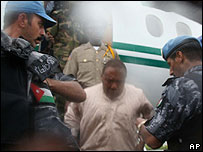
Recognition of Civil Society Role in the Charles Taylor’s Case
By Korto Williams
The Perspective
Atlanta, Georgia
April 1, 2006
 |
|
Courtesy of AP
|
Having said that, I believe that the capture of Charles
Taylor and subsequent transfer to the Special Court
in Sierra Leone is no small matter in our history.
We survived to see the demystification of one individual
whose personal goal to attain resources and its accompanying
power, destroyed the lives of many West Africans,
not just Liberians. Liberians call for a photograph
of Mr. Taylor’s arrival had more importance
that only we as a people understand. Charles Taylor
elevated himself to the level of a deity, while destroying
the lives of young people, women and children. His
regime depleted the energy and pride out of Liberians
and restricted our lives for approximately fifteen
years. Yes, we planned around Mr. Taylor, with his
ever changing and progressively destructive, whims
and caprices. His actions provided decision-making
around when we lived in displaced camps and when we
got raped.
With all of these actions having a direct effect on
Liberians, it is important to note that Liberians
did not take this lying down. Responses that led to
Mr. Taylor’s present residence emanated from
Liberian. We must relate the Charles Taylor’s
issue to our history and its documentation. It has
become so easy to thank the international community,
especially President Bush of the United States of
America regarding his government’s role in transferring
Mr. Taylor to Freetown, Sierra Leone to face justice,
something that Charles Taylor denied thousands of
people. The US government had a pivotal role in March
29th, 2006 victorious culmination, and perhaps commencement
of our newly achieved peace. This role can never be
underestimated, especially given the events of the
last 72 hours. The appreciation that Liberians extend
to the US Government, especially President Bush, Secretary
of State Rice,and relevant member of the Congress
is in place and genuine as the exile and capture of
Mr. Taylor was influenced by President Bush’s
utterances, and subsequent support to the UN Mission
in Liberia.
However, we must recognize the contribution of Liberians
in this process. This contribution must go down in
history and not be relegated and forgotten. When Liberia
was not a foreign policy priority for global institutions
and governments, Liberians took the responsibility
to make it that. For this struggle, they should be
commended. This advocacy effort took many forms but
rested on similar issues with Charles Taylor at the
core. It was a process that was supported and validated
by many Liberian individuals and organizations, who
saw the Charles Taylor issue as a threat to social
stability in Liberia and the West African region.
Liberian advocacy networks fearlessly influence this
process despite the numerous criticisms from at home
and abroad. As recent as March 27th,2006, a network
of human rights groups and non-profit think-tanks:
Catholic Justice and Peace Commission (JPC);Center
for Democratic Empowerment (CEDE); Foundation for
Human Rights And Democracy (FOHRD); Foundation for
International Dignity (FIND); Green Advocates and
Liberia Democracy Watch (LDW), were providing suggestions
for Mr. Taylor’s transfer. This advocacy process
began long before then, not only with this network
but also with women advocacy groups, notable Liberians,
among them, Dr. Amos C. Sawyer and Hassan Bility.
We need to remember and recognize this.